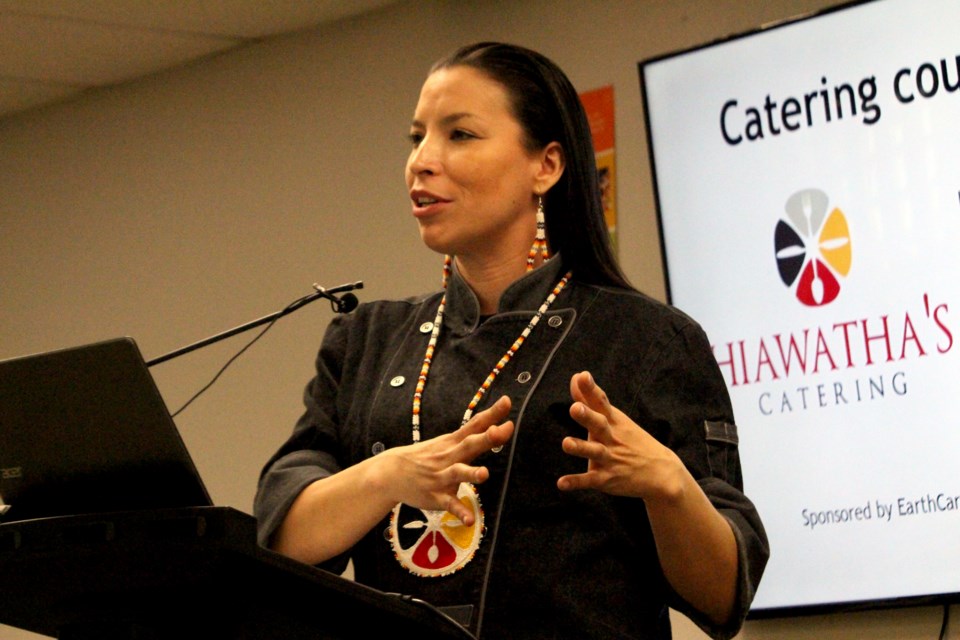We’ve all heard the saying “you are what you eat,” but how often does the impact of our nutritional decisions really come to mind?
On Feb. 19, Greater Sudbury’s Food Policy Council (FPC) hosted the sixth annual Four-Minute Foodies event at Tom Davies Square, where they introduced five representatives of the city’s food system.
It was followed by a 30-minute networking session with food provided by one of the afternoon’s speakers, Hiawatha Osawamick, owner of Hiawatha's Catering.
“Cause food just connects people, right?” said Erica Lagios**, food strategy outreach co-ordinator with the FPC, the afternoon’s host.
Four-Minute Foodies was designed to connect industry leaders to each other and guests in attendance, to support the community’s economic, physical and mental wellness, she said.
By highlighting new local businesses, ventures, and food system projects, Lagios said the series aims to educate guests on the impact of what they choose to consume while providing an option or inspiration for an alternative.
Its efforts align with the Greater Sudbury Food Strategy formally published in 2017, she said, which was created to guide the community towards an equitable, vibrant and sustainable food system based on five guiding pillars: healthy food access and literacy, growing food (not for profit), forest and freshwater foods, food retail, service and tourism, agriculture and food processing.
Lagios said that the Food Policy Council has been working towards a food strategy long before its publication or the introduction of Four-Minute Foodies, inspiring and connecting countless industry leaders along the way. These individuals make up Four-Minute Foodies' lineup and act as testament to the strategy’s success thus far.
What the strategy was lacking, said Lagios, was someone to co-ordinate those efforts, which is where the role of food strategy outreach co-ordinator comes into play.
As the first speaker of the afternoon, Lagios used her four minutes to explain the importance of her role and the plans she has for the city’s food strategy moving forward, including revitalizing a food literacy network, building relationships with neighbouring Indigenous communities and projects related to the Culinary Tourism Strategy launched in 2018.
Lagios was followed by Fionna Tough, seventh season grower and educator, who was representing Sudbury Shared Harvest that afternoon. In the past two years, Sudbury Shared Harvest introduced the city’s first edible food forest, and the four more that followed, assisted in the creation of a “Farm to Cafeteria” program at École Secondaire Hanmer and a Youth Agricultural Mentorship program at Lively District Secondary School.
But Shared Harvest isn’t stopping there, Tough said.
“Sudbury Shared Harvest is committed to enhancing our community spaces with resilient and beautiful urban agriculture projects, all the while creating jobs for youth, expanding their knowledge of food and their relationship and responsibility to this land,” she said.
“A city that can feed itself is a city with a true future.”
Showing appreciation for the land and its resources is also a guiding philosophy of Anishinaabe caterer and chef Hiawatha Osawamick, who spoke about the importance of “good food, good medicine” to her Indigenous heritage.
The healing power of food is also the guiding methodology of newly opened Seasons Pharmacy and Culinaria.
Since October, Seasons Pharmacy owner Rachelle Rocha and fellow pharmacist Laurie Pennell have been curating local, whole-food ingredients to put front and center of the full-service pharmacy’s programming and treatment plan, said Rocha. Medicine remains their primary focus, but they also host cooking classes.
“We’re never going to be a grocery store,” she said, “I just want to be the introduction to good food.”
The last speaker of the afternoon was Liz Anawati, co-owner of the Nickel Refillery, Sudbury’s first zero-waste store. Anawati said the Refillery offers additional programming, supports local food production, offers health-conscious products to consumers and educates both customers and partners on responsible consumption.
“Getting people to learn how to plan ahead and be more mindful of their consumption habits changes value systems, social norms and expectations people have for their community,” she said.
Find more information on the Greater Sudbury Food Policy Council’s Food Strategy here.
**In an earlier version of this story, Erica Lagios' name was mispelled. That has been corrected. Sudbury.com apologizes for the error.
